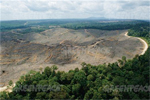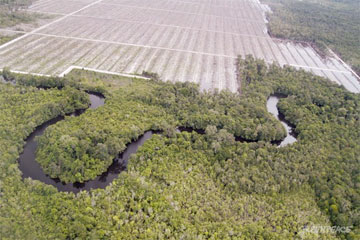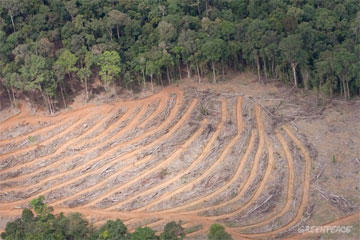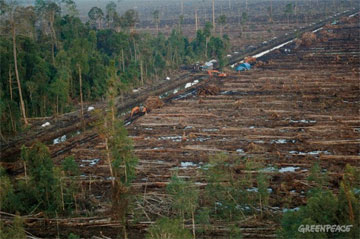Sinar Mas faces backlash from false claims made in response to environmental campaign against deforestation.
Sinar Mas, an Indonesian conglomerate whose holdings include Asia Pulp and Paper, a paper products brand, and PT Smart, a palm oil producer, was sharply rebuked Wednesday over a recent report where it claimed not to have engaged in destruction of forests and peatlands. At least one of its companies, Golden Agri Resources, may now face an investigation for deliberately misleading shareholders in its corporate filings.
In the report, released last week, Sinar Mas claimed auditors had cleared its subsidiaries of any wrongdoing under Indonesian law and the Roundtable on Sustainable Palm Oil (RSPO), a certification standard for palm oil production. It accused Greenpeace, an environmental group whose campaigns against PT Smart have led major buyers to drop it as a palm oil supplier, of exaggerating its case against the company’s palm oil.
But Wednesday BSI and Control Union, the auditor, released a statement distancing itself from Sinar Mas’s claims, noting that PT Smart had indeed engaged in clearing of forests and peatlands in violation of Indonesian law.
|
|
“It has come to the attention of BSI Group (BSI) that following the publication of the report ‘BSI-CUC Verifying Greenpeace Claims Case: PT SMART Tbk’ on 10 August 2010, there have been elements of the report that have been misreported as it has been published and presented,” read the statement, which went on to point out specific transgressions by PT Smart.
“There was planting on deep peat (> 3 m) in two estates from 2005 – 2008 which is in breach of the Presidential Decree with regards to deep peat issued in 1990. This also contravened SMART’s own operating instructions,” it said.
“In Central Kalimantan, all concessions examined were found to have carried out land clearance before the environmental impact assessment was approved.”
In the statement, BSI warned that RSPO membership rules do not sufficiently protect against organizations that have multiple subsidiaries, some of which may be certified and some of which may not, from misusing the RSPO label. BSI also said that contrary to Sinar Mas’s press releases and report, “Greenpeace reports had not stated that the Sinar Mas group destroyed primary forests.” Greenpeace only alleged that Sinar Mas companies had converted “rainforest” and “peatlands”.
BSI’s clarification was welcomed by Greenpeace.
|
PT Bangun Nusa Mandiri concession on 5 July 2010. © Rante/Greenpeace |
“Today’s announcement shows that Sinar Mas has manipulated the audit’s findings to try to convince shareholders and customers that they are a responsible and sustainable company. Now the truth is out. The audit shows that Sinar Mas repeatedly broke Indonesian law, RSPO rules and its own sustainability commitments,” said Bustar Maitar, Greenpeace South East Asia Forest Team Leader, adding BSI’s work shows that in eight out of 11 concessions audited, forest clearance was conducted without the necessary environmental permits.
“Not only did Sinar Mas need to backtrack on its false claims about Greenpeace reports, but this statement confirms that it broke Indonesian law and cleared many forest areas before assessing their conservation value, including potential orang-utan habitat.”
In failing to commission independent assessments to determine whether areas should be classified as being of high conservation value, PT Smart also broke RSPO rules. PR Smart is an RSPO member, which it hoped would make its palm oil more attractive to buyers concerned about environmental performance.
In light of the disclosure, Greenpeace says it has now filed complaints with the Singapore and Indonesia stock exchanges that Golden Agri Resources deliberately misled investors in recent corporate filings.
|
|
“Sinar Mas group of companies have been misleading their own shareholders as well as traders and analysts,” said Greenpeace in a blog posting. “That’s a pretty serious charge, and surely making announcements like that which knowingly mislead the stock exchange is likely to get them in very hot water.”
If the damage from the PT Smart episode weren’t enough, Sinar Mas is also facing criticism for its claims revolving around an audit of Asia Pulp & Paper (APP) — a paper products brand supplied by five companies — that has long been a target of green groups for its logging practices. Earlier this month APP released a report, “Getting the Facts Down on Paper” PDF], Asia Pulp & Paper (APP) notes it does not directly own or manage any forest concessions but that its products are produced by several pulp and paper companies in Indonesia including PT. Indah Kiat, it said cleared it of environmental misconduct alleged by NGOs. APP said Mazars, an international accounting and auditing firm, signed off on the validity of statements in the report. The apparent audit hasn’t been released but in a cover letter accompanying APP’s report, Mazars appears to distance itself from the document:
The Board of Directors of the [Asia Pulp & Paper brand] Companies are responsible for both the subject matter and the evaluation criteria.
Our responsibility is to report on the existence of external documentation that supports the accuracy of verifiability of the subject matter. Currently there are no statutory requirements or generally accepted verification standards in Indonesia that related to the reparation, presentation, and verification of the Report prepared by the Companies.
WWF Indonesia, one of the groups that has campaigned against APP after initially working with the brand to improve its environmental performance, said “the public is thus provided with nothing but a cover letter on an unpublished ‘assurance report’ about documents that are not made available to public.”
“We have no doubt, paper SMG/APP produces in its mills contains Sumatra’s timber from dense tropical rainforest,” Aditya Bayunanda WWF’s Pulp & Paper Coordinator for Indonesia said in a statement. “After pulping more than a million hectares of Indonesia’s forests since it first opened its Indah Kiat mill in Riau, Sumatra, APP applied for and plans to clear yet another 100,000 hectares of natural forest in 2009 and 2010.”
“These areas and the forests that were once there have been verified on satellite images, through aerial surveys and field visits many times.”
Logging of Sumatra’s forests by APP was most recently documented in Greenpeace’s “How Sinar Mas is Pulping the Planet,” which was released in July.
Environmental concerns have led Staples, Woolworths, Gucci Group, and Office Depot to drop APP products from their stores and supply chains. Carrefour, Tesco, and Kraft are reported to be in the process of phasing out APP products, while the Forest Stewardship Council (FSC), a standards setting organization for forest products, has revoked APP’s right to use “FSC-certified” labels on its products.
Related articles
APP refutes Greenpeace charges on deforestation, though audit remains absent
(08/12/2010) Asia Pulp & Paper, which has long been a target of green groups for deforestation and threatening imperiled species, is touting a new audit the pulping company says finds allegations made by environmental NGOs, including Greenpeace and WWF, are “baseless, inaccurate, and without validity”. Conducted by the international accounting and auditing firm Mazars, the audit itself has not been released; however Mazars has signed off on the validity of a 24 page document entitled “Getting the Facts Down on Paper”.
Audit finds palm oil company destroyed peatlands, but not primary forest

(08/10/2010) An environmental audit of palm oil company, PT SMART, found that the company had not cut primary rainforest, yet had destroyed carbon-rich peatlands; however the audit analyzed only 40 percent of PT SMART’s holdings and investigated none of its plantations in New Guinea. A subsidiary of agricultural giant Sinar Mas, PT SMART has been accused in a number of reports by Greenpeace of both destroying high conservation value forests and draining peatlands. Greenpeace’s reports caused both food giants Unilever and Nestle to drop PT SMART as a supplier of their palm oil, while Cargill stated it would wait to hear the results of the audit. Given the audit’s results, both sides are claiming victory.
Longtime target of green groups, Cargill, to supply sustainably-certified palm oil to Unilever

(07/30/2010) Agriculture giant Cargill has announced an agreement to supply Unilever with 10,000 metric tons of palm oil sustainably-certified from the Round Table for Sustainable Palm Oil (RSPO). Cargill has often come under fire from green groups for being linked to the rainforest destruction. The Dutch-English company Unilever—the world’s biggest buyer of palm oil—has been trying to move its palm oil sources away from deforestation with a goal of sourcing only ‘sustainable’ palm oil by 2015.
How Greenpeace changes big business

(07/22/2010) Tropical deforestation claimed roughly 13 million hectares of forest per year during the first half of this decade, about the same rate of loss as the 1990s. But while the overall numbers have remained relatively constant, they mask a transition of great significance: a shift from poverty-driven to industry-driven deforestation and geographic consolidation of where deforestation occurs. These changes have important implications for efforts to protect the world’s remaining tropical forests in that environmental groups now have identifiable targets that may be more responsive to pressure on environmental concerns than tens of millions of impoverished rural farmers. In other words, activists have more leverage than ever to impact corporate behavior as it relates to deforestation. A prime example of this power is evident in a string of successful Greenpeace campaigns, which have targeted some of the largest drivers of deforestation, including the palm oil industry in Indonesia and Malaysia and the soy and cattle industries in the Brazilian Amazon. The campaigns have shared a common approach: target large, conspicuous consumer-facing companies that sell in western markets.
Walmart fires back at Greenpeace over deforestation charges

(07/07/2010) Walmart on Wednesday fired back at Greenpeace after the activist group linked the retail giant to destruction of Indonesia’s rainforests through its purchases from Sinar Mas Group’s Asia Pulp & Paper (APP), a Singapore-based firm associated with destructive logging practices. Noting that it was already working with Greenpeace to eliminate deforestation from its supply chain, the world’s largest retailer said it “does not support deforestation” and does not source from APP for its “largest markets.” Walmart said it was “surprised” Greenpeace targeted it in a recent press release announcing a new report.
KFC, Walmart contributing to destruction of Indonesia’s rainforests, endangering orangutans

(07/05/2010) Major U.S. companies are contributing to the destruction of Indonesia’s rainforests by sourcing paper from Asia Pulp and Paper (APP), a subsidiary of Indonesia-based conglomerate Sinar Mas, alleges a new report from Greenpeace. Investigating two sites on the Indonesian island of Sumatra, the activist group documented destruction of rainforests and carbon-dense peatlands by APP, a company that has lost several major contacts in recent years due to its poor environmental record. Greenpeace called out Walmart, Auchan, and Kentucky Fried Chicken (KFC) as companies that continue to buy from APP despite its role in deforestation and peatlands degradation.


